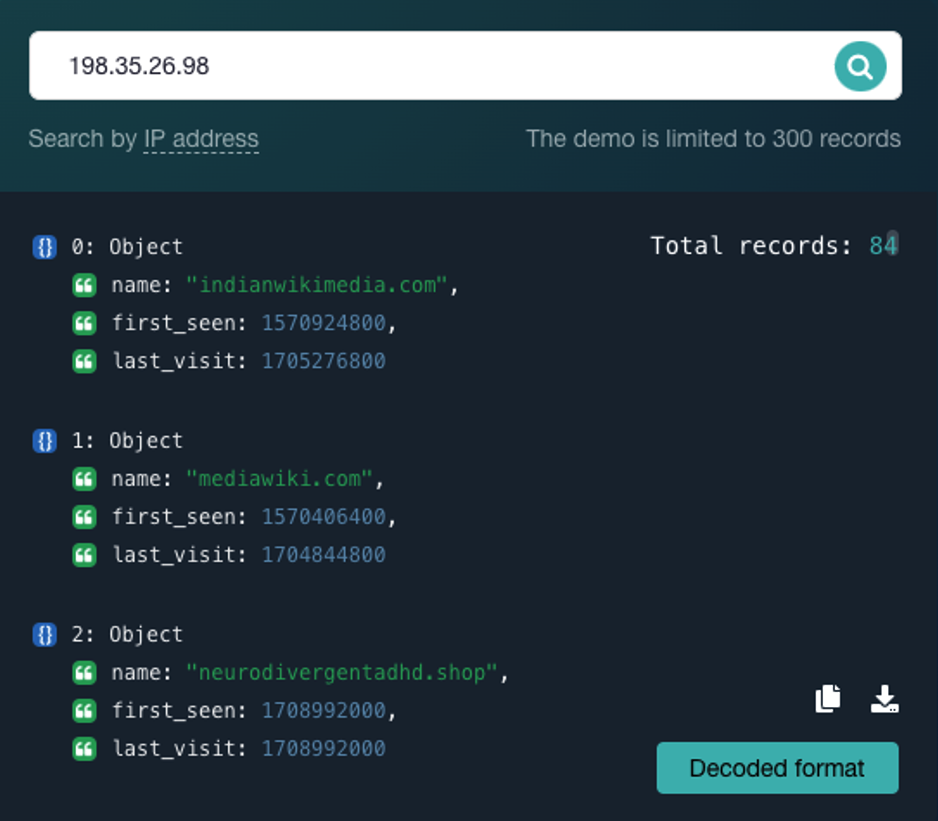
Imagine the Internet as a vast, sprawling city. Each device, like a server, smartphone, or computer (yes, including your device), is one building. And, just like in an actual city, where every building has its address, each device connected to the web also has its unique address.
This is called an IP address.
Now, let’s say you want to find the owner of an IP address. Just like you can think of an IP address as a building address, you can think of a domain name that “lives” on that IP as the person or business name.
So, if you have the domain name, you can use IP lookup to find the Internet Protocol address based on the domain name from the domain registrar, just as you would find a street address from the street registry.
So, what is a reverse IP lookup?
Reverse IP Address Lookup Explained
Let’s say someone gives you the street address but not their name. Servers are like large buildings, but servers host websites instead of people and apartments.
If the server has enough RAM and CPU, there’s no limit to how many websites it can host.
So, imagine standing before a large building, trying to find who lives there.
This is what it would be like to have the IP address but not the domain name.
Here’s where the reverse IP lookup comes in. If a “traditional” IP lookup is asking, “Where is a domain hosted?” a reverse IP lookup is asking, “What domains are hosted on this IP address?”
Difference Between Reverse IP Lookup and Reverse DNS Lookup
Reverse IP and DNS lookup are related concepts but have different purposes.
A reverse IP lookup helps identify all websites (domain names) hosted on an IP address. For instance, if you want to know what websites share the same server resources, you would perform a reverse IP address lookup.
Contrary to it, a reverse DNS lookup, or rDNS, is the process of finding out a particular domain name associated with an IP address and involves querying the DNS for a pointer record (PTR) to find the domain name linked to an IP address.
Why Do You Need to Perform a Reverse IP Lookup?
A reverse IP lookup can have several applications, from fraud detection and cybersecurity to market research and website strategy.
1. Cybersecurity Assessment
Picture this. You’re a new website owner, and you’re looking for a server to host your website (otherwise, you can’t get an IP, and DNS won’t “know” where to find your website.
You have two options. Host your site on a shared server, where you share resources with other websites like yours, or get a dedicated server just for your website.
Of the two, shared hosting is a much cheaper option and will cost you around $1 to $20 per month, whereas dedicated hosting can cost more than $200 per month.
So why would you pay several hundred dollars more?
The cybersecurity risk is far greater with shared hosting than with dedicated hosting.
A reverse IP lookup is a way to assess these risks by understanding the profile of websites or domains on a server. Simply put, sharing the same IP address as a compromised domain will also reflect poorly on your domain and business.
2. Fraud Prevention
Another reason to use reverse IP is to prevent online fraud. By performing this lookup, you can detect phishing schemes that operate from the same server and IP address.
This is particularly useful for law enforcement and security firms, who need to gather intelligence and take down fraudulent websites and online scammers.
A reverse IP lookup can also help you understand the scammer’s digital footprint and take preventive measures to mitigate the risk of cyber threats.
3. Website Strategy
If your company manages multiple websites, a reverse IP address lookup can help you ensure they all follow the same website and SEO strategy.
This is particularly important for webmasters and SEO specialists who need to make informed decisions regarding diversification of hosting and avoiding association with spammy websites on shared servers, which can negatively impact their website's reputation.
4. Competitive Analysis
Finally, a reverse IP lookup isn’t just used to learn about the server your domain is hosted on. You can also use this to learn more about your competitors and understand their technology and operations.
This can be an invaluable insight into your competitors and whether you should upgrade to a dedicated hosting server.
At the same time, a reverse IP lookup, from the point of competitive analysis, can also help you find strategic partnerships for your domain or uncover those of your competitors.
How to Perform a Reverse IP Lookup?
Now that you understand the what and why of a reverse IP lookup, let’s discuss how to perform it.
A reverse IP address lookup has 4 steps.
1. Identifying an IP Address
First, you need an IP address. Usually, to find this, we would use an IP Lookup tool and type a domain name, like “wikipedia.com”, and it would give us an IP address like 198.35.26.98. However, we already know the IP, not the domain name, so we need to do some extra steps.
2. Use a Reverse IP Lookup Tool
A few online tools allow you to do a reverse IP lookup, such as:
- WhoisXMLAPI
- HackerTarget
Simply choose the tool that best suits your needs. The most significant difference is really in things like speed or user interface.
3. Perform the Lookup
Enter the known IP address in the search bar and click Submit.
4. Review Your Results
Here’s how the results look for one of these tools when we look up Wikipedia’s IP address 198.35.26.98:

You can see on the left side all domain names for this IP address, including their name, and on the right, the total number of records on the top (84 in this case) and buttons to copy and download the search at the bottom, as well as the option to view the records in a decoded format.
Conclusion
A reverse IP lookup is a handy tool for your toolbox as a web owner. You can use it to:
- mitigate cyber threat risk
- detect phishing and other online scams
- consolidate your website and SEO strategy
- better understand your competitors
Check out our Online Tools suite and learn everything you want to know about IPs and DNS.
Share this post
Leave a comment
All comments are moderated. Spammy and bot submitted comments are deleted. Please submit the comments that are helpful to others, and we'll approve your comments. A comment that includes outbound link will only be approved if the content is relevant to the topic, and has some value to our readers.


Comments (0)
No comment